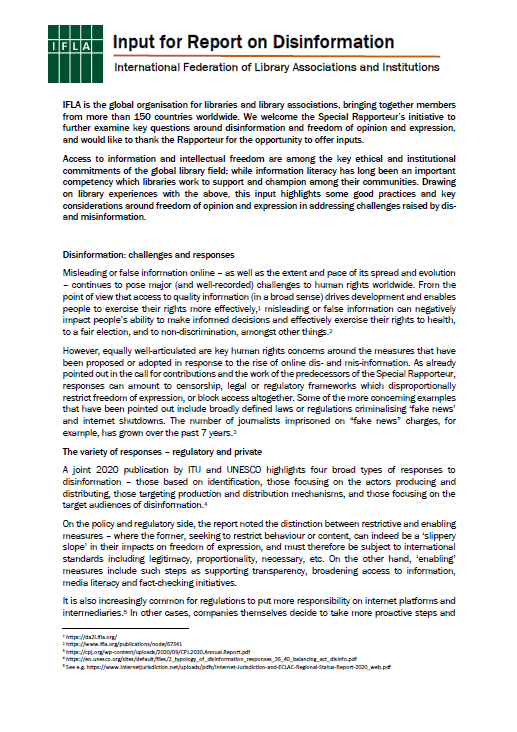Media and Information Literacy as a Reponse to Disinformation
23 February 2021
IFLA has responded to a call for inputs, issued by the United Nations Special Rapporteur on the promotion and protection of the right to freedom of opinion and expression, about the human rights impacts of measures against disinformation.
The submission highlights the potential of media and information literacy as a way to help address dis- and mis-information; alongside not restricting freedom of expression, it can help deliver on other key human rights, like the rights to health or to a free and fair election.
Concerns over – and dialogue about ways to address – the negative impacts of false and misleading information online have remained high on the agenda over the past months, particularly in the light of prominent examples of health and electoral dis- and mis-information.
Disinformation, uniquely challenging in the increasingly dense and complex digital information environment, interferes with individuals’ ability to make informed decisions and realise their essential human rights.
However, the new call for inputs by the UN Special Rapporteur also draws attention to the concerns about human rights impacts of measures which different stakeholders – from states to online platforms, human rights organisations and others – take to combat disinformation.
These include, of course, the impacts of broadly – or vaguely – defined “fake news” laws on freedom of expression and opinion, or of internet shutdowns that inflict a heavy cost on people’s access to information as a driver of development and rights.
On this basis, IFLA’s submission highlights the potential of media and information literacy interventions to help address the challenges of mis- and dis-information. Drawing on the global library field’s experiences, it points to some possible good practices and insights from ongoing work and research in this field – from targeted and tailored outreach initiatives that can help reach those who are not currently in formal education, to scalability and replicability of interventions.
Of course, this is an emerging field. Our understanding of how media and information literacy interventions can be effectively leveraged against disinformation, pitfalls to avoid and ways to maximise impact, continues to evolve. That’s why the submission emphasises the need for more research and cross-stakeholder collaboration, and the fact that libraries can and do offer valuable practical and theoretical insights for this ongoing discussion.
You can download the submission on the publication page.
